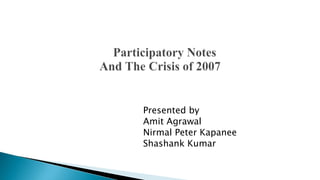
Participatory Notes And The Crisis of 2007
- 1. Presented by Amit Agrawal Nirmal Peter Kapanee Shashank Kumar
- 2. Participatory Notes or P-notes are financial instruments used by foreign investors or hedge funds to invest in Indian securities, such investors are not registered with Securities and Exchange Board of India (SEBI). Access to the Indian capital market is limited to Foreign Institutional Investors (FII) registered with SEBI, so the market has thus created a pass through mechanism through P-notes. These financial instruments are issued by FII’s to overseas investors who are not registered with SEBI, but wish to invest in the Indian stock market. The value of P-notes is determined on the basis of the underlying assets so purchased by the overseas investor. Here the underlying assets are shares listed on the Indian stock exchange. Any dividends or capital gains collected from underlying instruments go back to the overseas investors via brokerage house based in India.
- 3. UK based investor Foreign Broking House (UK) Foreign Broking House (India) X Shares Issues P-notes with X shares as underlying asset Conformation of Shares Purchased Buy X shares Buy X Shares Buys
- 4. Any Overseas investor who is investing in Indian stock market through P-notes is not required to register with SEBI, but all FII’s have to get registered compulsorily. Some overseas investors route their investment through P-notes to take advantage of the tax laws of certain preferred countries. For example through double tax avoidance agreements by India with certain countries, capital gains arising from sale of shares are taxable in the country of residence of the shareholder and not in the country of residence of the company whose shares have been sold. P-notes are popular since they provide greater degree of anonymity thereby enabling hedge funds to carry out their operations without disclosing their identity. It is not obligatory for the FII’s to disclose their client details to SEBI unless asked specifically.
- 5. Investors ineligible to apply for FII status. choose not to apply for FII status because the participatory note route is quick and easy. investors, some of whom have FII status, to hide their Identity.
- 6. Prodigal Money Returning. A large number of politicians/ bureaucrats /business-persons have accumulated wealth abroad. Foreign governments/entities who would like to acquire/control Indian entities by taking them over Terror Financiers
- 7. The cost of using participatory notes is higher than going direct the buyer is a captured client of the participatory note issuer in that it must exit the position through the broker/issuer of the participatory note.
- 8. On the 16th of October, 2007, SEBI (Securities & Exchange Board of India) proposed curbs on participatory notes which accounted for roughly 50% of FII investment in 2007. SEBI was not happy with P-Notes because it is not possible to know who owns the underlying securities and hedge funds acting through PNs might therefore cause volatility in the Indian markets. However the proposals of SEBI were not clear and this led to a knee-jerk crash when the markets opened on the following day (October 17, 2007). Within a minute of opening trade, the Sensex crashed by 1744 points or about 9% of its value.
- 9. This led to automatic suspension of trade for 1 hour. Finance Minister P.Chidambaram issued clarifications, in the meantime, that the government was not against FIIs and was not immediately banning PNs. The SEBI chief, M.Damodaran held an hour-long conference on the 22nd of October to clear the air on the proposals to curb PNs where he announced that funds investing through PNs were most welcome to register as FIIs, whose registration process would be made faster and more streamlined. The markets welcomed the clarifications with an 879-point gain on october 23rd
- 10. Issue in this case, whether SEBI could ask FII to furnish undertaking that they had not dealt in respect of ODI with Indian residents, non-resident Indians, persons of Indian origin or overseas corporate bodies in absence of a bar on such deals. Under the law there is no bar on the FII or their sub-account to deal with OCBs. The court said that it is not the case that the Board cannot call upon the FII to report about their activities. The court is only disapproving the action of the Board in so far as it requires FII to furnish the undertaking as prescribed for the first time in the revised reporting format in absence of a bar prohibiting them from dealing in ODIs.
- 11. SEBI wanted to investigate whether the conduct of UBS and other players was in violation of SEBI (prohibition of fraudulent and unfair trade practices relating to securities market) regulations, 2003. SEBI called for information from UBS relating to its major ODI clients. There is no requirement under regulation 15A in terms of KYC requirement to give the names of top 5 investors of the clients of UBS.
- 12. Under regulation 20 every FPI shall submit information, documents as and when required by the Board. The court said that a plain reading of regulation 20 makes it clear that it is not obligatory on the part of the FII to provide information pertaining to top five investors of the clients of UBS.